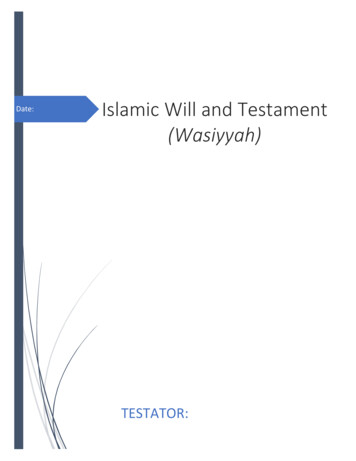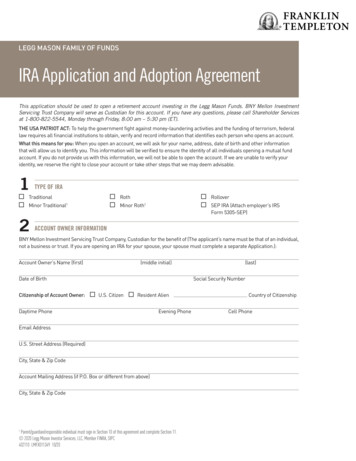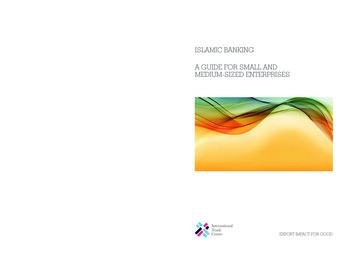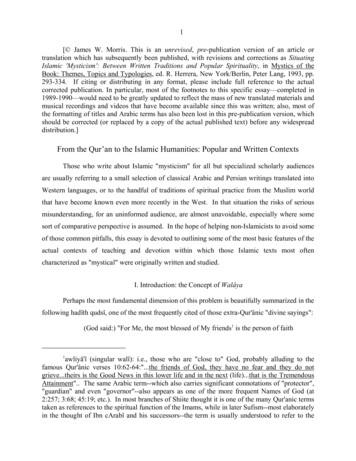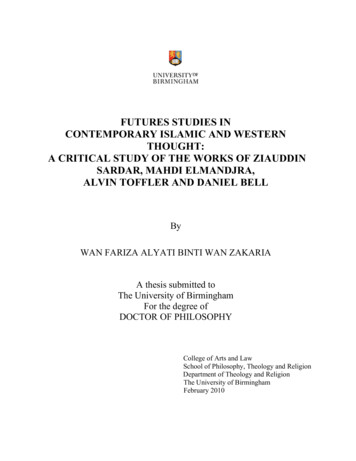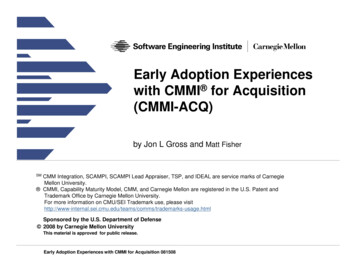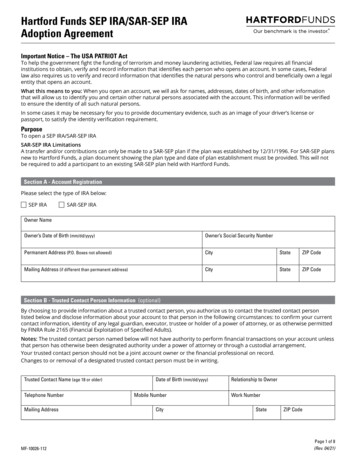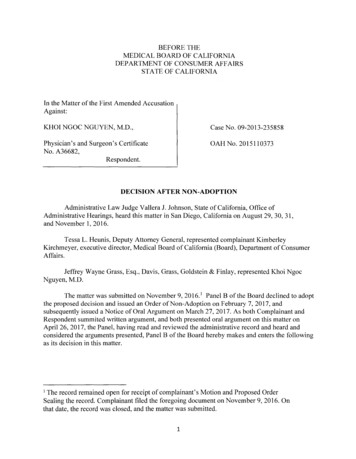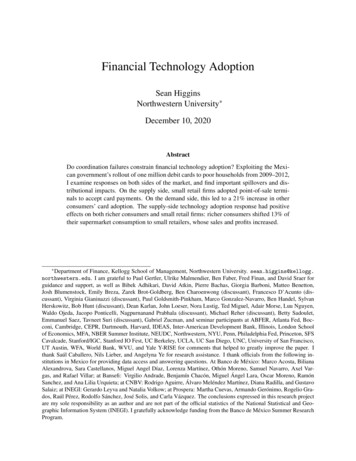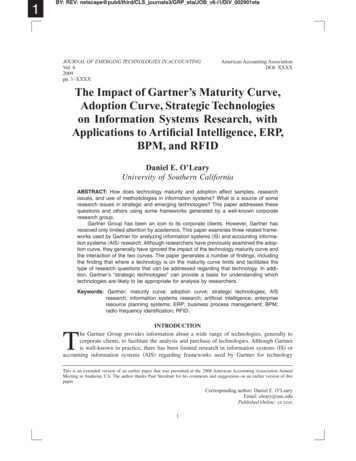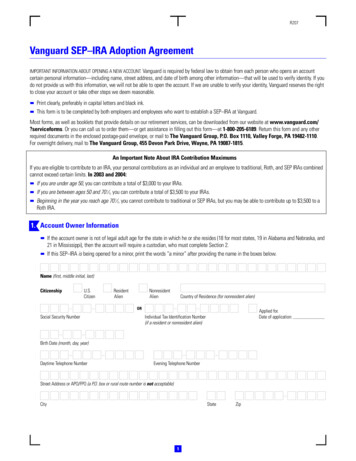
Transcription
International Journal of Humanities Social Sciences and Education (IJHSSE)Volume 2, Issue 1, January 2015, PP 1-11ISSN 2349-0373 (Print) & ISSN 2349-0381 (Online)www.arcjournals.orgWasiyyah (Islamic Will) Adoption and the Barriers in IslamicInheritance Distribution among Malaysian MuslimsZ.H. GhulUniversiti Teknologi Mara, MalaysiaM.H. YahyaUniversiti Putra MalaysiaA. AbdullahUniversiti Putra MalaysiaAbstract: The amount of frozen assets due to unclaimed inheritance in the muslim society in Malaysia issignificant. There are is about a million land titles that are still in the name of the deceased owners. In2012, the amount of frozen estates is estimated to be around RM45 billion and this figure is expected toincrease further. This statistics is alarming and calls for an urgent need in solving the problem ofunclaimed inheritance in the Muslim society in Malaysia. It is imperative to teach that Muslims have aclear idea on the appropriate instruments and course of actions in estate planning. The majority of Muslimsin Malaysia do not view estate planning as a serious matter. Previous researches attest that some of theMmuslims, themselves, are sceptical about making a Wasiyyah (Islamic Will). This is the evidencencedsubstantiated by the large number of Malaysian Muslims who do not have Wasiyyah. In general, the level ofawareness of Wasiyyah practice is not very encouraging, specifically, among Malaysian Muslims.Thefindings from this study show that 1) knowledge on the concepts of Islamic estate planning and 2)awareness of the importance wealth management have a significant effect towards Wasiyyah practices. Interms of barriers in Islamic inheritance distribution, the biggest obstacles among all the factors are lengthyestate management and distribution process.Keywords: Wasiyyah, Will, Islamic Will, Bequest, Islamic Inheritance1. INTRODUCTIONLeaving a Wasiyyah (Islamic Will) assists in the smooth processing and settlement of the estateadministration. Beyond the provision of Faraid (Islamic Law of inheritance) and bequest, Islamicestate planning demands calls for a proper planning. It is important and recommended that foreach Muslim to write a will prior to his or her death because a will allows one to decide on whathappens to his or her money, property and possessions after death (Harbi, 2013). With referenceto a Hadith (prophet Muhammad‟s pbuh1 saying), narrated by Abu-Huraira: A man asked theProphet “O Allah’s Messenger! What kind of charity is the best?”. He replied ,”To give in charitywhen you are healthy and greedy, hoping to be wealthy and afraid of becoming poor. Don’t delaygiving in charity till the time comes when you are on the deathbed when you say, ’Give so much toso-and-so and so much to so-and-so,’ and at that time the property is not yours but it belongs toso-and-so(i.e your inheritors).”The distribution of estate for Muslims is confined within Islamic system of Faraid (Islamic law ofinheritance). Faraid protects heirs‟ rights with predetermined fixed entitlements of eligible heirs,whereas bequest/Wasiyyah allows Muslims to bequeath up to one-third of the estate to non-heirsand they opt for Hibah if unlimited devolution is their main concern. Waqf, is an act of giving tocharity and is a mean for Muslims to devote their faith to Allah to gain rewards in the hereafter.Therefore, Wasiyyah (bequest), Hibah (gift) and Waqf (charity) are estate planning tools whichMuslim can use to accommodate the laws of inheritance.1Peace be upon him ARCPage 1
Z.H. Ghul et al.In Malaysia, Muslims are allowed to manage their property based on Shari’ah (rules in Islamrules) principles. Wealth accumulation is permissible in Islam on the condition that there is noelement of manipulation, injustice, or monopoly of wealth. Besides Further more that, the waywealth is accumulated must be acceptable and permissible by Shari’ah laws. The wealth shouldalso be spent in ways that gets obtains God Allah‟s blessing and reward.In order to safeguard wealth, Islamic finance emphasizes on the 1) true ownership of assets, 2) theprocess to accumulate wealth and 3) the uses of wealth. The process of wealth accumulationshould be free from any form of oppression, especially, riba (usury usury(riba) (Yahya et al.2012). Wealth is related to prosperity. It refers to the physical belongings of a person, such as,land, cash, business, house and much more. Unforeseen circumstances (such as sudden loss oflife) might affect the deceased‟s distribution of his or her wealth. Proper management of wealthis necessary in ensuring a desirable posthumous distribution of wealth. Wealth management inIslam does not ignore the obligation to ensure that wealth is circulated as widely and fairly aspossible in inheritance.The function of wealth management is to ensure the proper planning of wealth distributionthrough estate planning, business succession planning, charity and zakah (alms-giving) planning.The mechanisms for wealth management in Islam includes zakah, Wasiyyah( Islamic Will),Faraid (Islamic law of inheritance), Hibah (gift) and Waqf (endowment or charity), trust,Sadaqah (donations), Infaq (gift to Islamic cause), hadiyyah (present or gift), nazar (vow) andstatutory disposition (Billah, n.d.a; Rasban, 2006:191–1999). In 2005, out of 6.2 million acres ofunclaimed land, 900,000 acres were still recorded under the name of the landlords who havepassed on. From the government‟s perspective, it loses income in the form of the land taxestimated at RM200 million (Ahmad & Laluddin, 2010). Almost one million land title deeds stillbelong to the deceased (Salam, 2006). On top of that, the number of unclaimed inheritance isincreasing over the years (BERNAMA, 2010; Dewan Rakyat Parlimen Kedua Belas PenggalKetiga Mesyuarat Pertama Bil. 11, 2010; Rakyat Guides 3, 2010; Salam, 2006). Theaccumulation of unclaimed inheritance is a serious problem and needs to be addressed (Noordin etal., 2012).2. RESEARCH QUESTIONSThe research questions of this study are as follows:1. What is the relationship between knowledge on the concepts of Islamic estate planning andawareness of the importance wealth management among Malaysian Muslims in writingWasiyyah’?2. What are the major life events that individuals experienced which can influence them onWasiyyah adoption?3. What are the possible institutional related issues with regards to the (Wasiyyah writingproviders) that affects Wasiyyah adoption?4. What is more likely to be bequeathed in a Wasiyyah and how wealth managementaffectsWasiyyah adoption?5. What are the barriers in Islamic inheritance distribution?3. OBJECTIVES OF THE STUDYThe objectives of this research are:1. To examine the relationship between knowledge and awareness with regards to Wasiyyahadoption among Muslims in Malaysia.2. To examine the relationship between life events and Wasiyyah adoption.3. To examine the relationship between institutional characteristics (Wasiyyah writing providers)and Wasiyyah adoption.4. To examine the relationship between types of wealth management assets and Wasiyyahadoption.5. To identify the barriers in Islamic inheritance distribution.International Journal of Humanities Social Sciences and Education (IJHSSE)Page 2
Wasiyyah (Islamic Will) Adoption and the Barriers in Islamic Inheritance Distribution amongMalaysian Muslims4. THEORETICAL FRAMEWORKThis research model includes five variables. The dependent variable in this research is „adoptionof Wasiyyah among Malaysian Muslims society‟. The (independent variables in this study are; 1)knowledge, 2) type of wealth management assets, 3) institutions, and 4) life events). The „factorsinfluencing Wasiyyah adoption‟ independent variables above takes into account a number ofvariable clusters. The control variable for this research is socio-demographic factors. The detailedbreakdown of the variables related to each of the research clusters can be seen in Figure 1 below.KnowledgeLife Events( widow, health relatedproblems, disabled)H1H2WasiyyahAdoptionH3Institutional FactorsPerformance Professionalism,Quality of ServicesH4Type of Wealth ManagementassetsSaving, insurance, retirementpension, property,estments5. LITERATURE REVIEWEvidence on the relationship between Knowledge, Life Events, types of Wealth Managementassets, Institutions and Wasiyyah practicesMajority of Muslims in Malaysia are aware and familiar with the term Wasiyyah (Islamic Will)but they do not have a clear understanding about it (Ahmad & Peyman, 2008). It is found that themain reasons Malaysian Muslim community practises Wasiyyah is 1) to protect adopted children,and 2) to get rewards for good deeds in the hereafter (Yaacob, 2006). He concludes that estateplanning matters are mostly neglected by the Muslims of the Malay races compared to otherMuslims. Moreover, ARB (n.d.a) claims that, generally, about 90 percent of Malaysians do nothave a Will. T, hence this proves that the level of awareness among Malaysian on Islamic estateplanning is very low. Thise percentage is no different between Malaysian Muslims and nonMuslims. The level of Wasiyyah adoption is measured by the number of Wasiyyah which havebeen kept under ARB.(Alma‟amun, 2010).To leave a Wasiyyah in Malaysia is not a straightforward task due to several aspects. The firsthurdle lies in the rules and regulations that are related to estate administration and settlement.Interestingly, in Malaysia, dying intestate and testate is dealt under different legislations andauthorized bodies. Even with the involvement of various authorized bodies and compliance withthe provisions of legislations, it still does not assure that the process of estate administration andsettlement will be smooth. Previous studies show that it is easier to administer and settle testateestate. It may take years to settle the case of dying intestate as it could lead to frozen estateproblems and delays in the settlement period. According to Azizi and Abdul Rahman (2010),Amanah Raya Berhad (ARB, a trustee agency) claims that there has been about RM40 billionworth of frozen estates until mid-2009 due to intestate death. Thise value increased to RM42billion in 2011 (MStar Online, 2011). In Malaysia, the inefficiency of the estate distribution is theInternational Journal of Humanities Social Sciences and Education (IJHSSE)Page 3
Z.H. Ghul et al.result of overlapping powers by various authorities that lead to public confusion (Muhamad,2007). It is important to note that the nominees of the Wasiyyah are supposed to act as executorsrather than beneficiaries as drawn by fatwas issued in Malaysia (Muhammad, 2007; Saidali, 2007;Osman, 2007; Mohd. Awal, 2007; Hassan, 2008; Awang, 2006).According to Stum (2000), the occurrence of stressful life events, or the anticipation of suchevents, may motivate the individual to take observable actions, such as to adopt a Will. Somestressful life events, such as being diagnosed with a terminal disease, may also cause theindividual to anticipate additional end-of-life stressors. Some of these stressors may result from anuncertainty about how the individual‟s personal belongings and emotional artifacts will bedistributed to others, or how the distribution of his or her belongings may lead to strife andconflict among family members and friends (Stum, 2000). A will could be used to manage thecurrent and anticipated stressors associated with major life events. Some of these unexpected lifeevents may also result from the uncertainties about how the individual‟s assets, property orpersonal belongings will be distributed to others after his or her passing on. Bickerings on howthe distribution of his or her belongings may lead to strife and conflict among family membersand friends emerge.To avoid these issues, a Wasiyyah could be used to manage the current and anticipated stressorsassociated with the major life events. Palmer et al., (2006), has identified four life events;(1)becoming a widow,(2)being diagnosed with cancer, (3) retiring, and (4) having a positivechange in assets, as connected with an individual‟s decision to adopt a will and trust.Previous studies identify money demand as one of the factors that influences Will practices. Thisstudy applies the same variable but views it from the Islamic point of view, which is, Wasiyyahadoption. Economic definition for money demand is the quantity of money balances that thepublic wants to hold. There are three basic motives for holding money: for transactions, as aprecaution, and for speculation. In general, money demand can be referred to as wealthmanagement. Muda et al., (2006) divide the forms of wealth management into three groups:(1i)managing wealth for the individual‟s and family‟s necessities as well as mandatory socialobligations, (2ii) managing wealth for other people‟s necessities, and (3iii) managing wealth forpublic and general welfare. Tin(2009) states that householders with bequest motives are thereforefar more likely to save in monetary assets than those without observable bequest motives.A previous study done by Rossi and Rossi (1990) reveals that the most common items, things orassets that are given through wills are personal possessions. Thirty-seven percent or more of therespondents in their study are beneficiaries of photographs, books or paintings, jewellery, dishesand silverware, furniture, or a family bible. In comparison, 19% or fewer of the respondents hadbeen are beneficiaries of land or property, stocks or bonds, or vehicles.According to (Afiqah et al., 2011), the law and the process of claiming estates is viewed by manypeople as a complex procedure because of the numerous regulations and involvements of severalbodies in the its distribution process. On top of this, the complexity has led to the overlappingpowers and responsibilities of these entities. As a result of the complex law and procedures, heirsof the deceased may possibly be confused. This may affect his or her decision to claim the estate.No matter where the applicat
Faraid (Islamic law of inheritance), Hibah (gift) and Waqf (endowment or charity), trust, Sadaqah (donations), Infaq (gift to Islamic cause), hadiyyah (present or gift), nazar (vow) and statutory disposition (Billah, n.d.a; Rasban, 2006:191–1999). In 2005, out of 6.2 million acres of unclaimed land, 900,000 acres were still recorded under the name of the landlords who have passed on. From .
